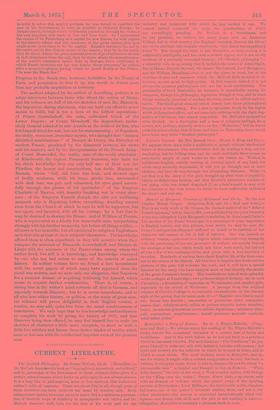CURRENT LITERATURE.
The Scottish Philosophy. By James McCosh, LL.D. (Macmillan.)— Dr. McCosh describes his book as "biographical, expository, and critical," and its possession of the first-named of these characteristics gives it a certain attractiveness which books on philosophy do not always possess. It is a long line of philosophers, more or less eminent, that makes our author's table of contents. There are about fifty in all, though some of them doubtless can have received the name by courtesy only. Even unimportant names, however. serve to make this a continuous presenta- tion of Scottish ways of thinking in metaphysics and ethics, and Dr. McCosh deserves well, both for the idea of his work and for the
industry and judgment with which he has carried it out. Wo cannot indeed commend his style, the peculiarities of which are exceedingly puzzling. Dr. McCosh is a Scotchman, and he has presided, we believe, for many years over an American College, but to what country (for England certainly disowns the idiom) are we to attribute the singular expression, " this frank but expediency letter "? But though the style is not attractive, or even correct, it is sufficiently intelligible, and has even a certain vigour, and is not wholly destitute of a carefully concealed humour. Of "Scottish philosophy "- a tolerably wide term, seeing that it includes the names of Adam Smith, David Hume, Dugald Stewart, Sir James Mackintosh, Lord Brougham, and Sir William Hamilton—this is not the place to treat, but of the sketches of men and manners which Dr. McCosh finds occasion to in- troduce, we can speak in high praise. In this respect, indeed, it is not always the greatest philosophers who are the most entertaining. The personality of Lord Monboddo, for instance, is remarkable among his compeers, though his philosophy, ingenious though it was, and in some things curiously prescient of modern theories, cannot bo called authori- tative. The theological element which enters into these philosophical biographies is interesting. For a man to speculate freely in the region which philosophers affect, and not come into collision with the rigid dog- matics of Calvinism, was almost impossible. Dr. McCosh's sympathies seem divided. As a theologian and a man of religions feelings, he is severe, not, perhaps, unjustly severe, on the "Moderates," but he would probably acknowledge that if there had been no Moderates, thew would have been very little " Scottish philosophy."


































 Previous page
Previous page